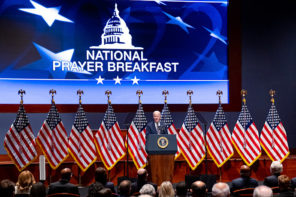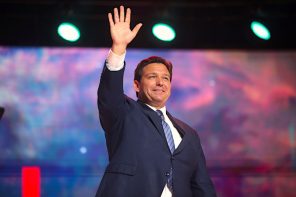Many conservative commentators are apoplectic over these remarks by President Obama at the National Prayer Breakfast yesterday:
But we also see faith being twisted and distorted, used as a wedge — or, worse, sometimes used as a weapon. From a school in Pakistan to the streets of Paris, we have seen violence and terror perpetrated by those who profess to stand up for faith, their faith, professed to stand up for Islam, but, in fact, are betraying it. We see ISIL, a brutal, vicious death cult that, in the name of religion, carries out unspeakable acts of barbarism — terrorizing religious minorities like the Yezidis, subjecting women to rape as a weapon of war, and claiming the mantle of religious authority for such actions.
* * * *
Humanity has been grappling with these questions throughout human history. And lest we get on our high horse and think this is unique to some other place, remember that during the Crusades and the Inquisition, people committed terrible deeds in the name of Christ. In our home country, slavery and Jim Crow all too often was justified in the name of Christ. Michelle and I returned from India — an incredible, beautiful country, full of magnificent diversity — but a place where, in past years, religious faiths of all types have, on occasion, been targeted by other peoples of faith, simply due to their heritage and their beliefs — acts of intolerance that would have shocked Gandhiji, the person who helped to liberate that nation.
So this is not unique to one group or one religion. There is a tendency in us, a sinful tendency that can pervert and distort our faith. In today’s world, when hate groups have their own Twitter accounts and bigotry can fester in hidden places in cyberspace, it can be even harder to counteract such intolerance. But God compels us to try. And in this mission, I believe there are a few principles that can guide us, particularly those of us who profess to believe.
And, first, we should start with some basic humility. I believe that the starting point of faith is some doubt — not being so full of yourself and so confident that you are right and that God speaks only to us, and doesn’t speak to others, that God only cares about us and doesn’t care about others, that somehow we alone are in possession of the truth.
They’re apoplectic because, as Ed Kilgore aptly interprets it, they believe “we’re in a ‘religious war’ and the president needs to show solidarity with ‘our’ religion.” Suggesting that Christianity has ever been used as a pretext for violence is, in this view, sacrilege.
But as the evangelical writer Rachel Held Evans points out, “Acknowledging that violence and injustice has been committed by Christians and in Christ’s name shouldn’t be controversial. It’s a fact.” Ta-Nehisi Coates adds, in a post titled “The Foolish, Historically Illiterate, Incredible Response to Obama’s Prayer Breakfast Speech,” that of course “Christianity did not ’cause’ slavery, anymore than Christianity ’caused’ the civil-rights movement. The interest in power is almost always accompanied by the need to sanctify that power. That is what the Muslims terrorists in ISIS are seeking to do today, and that is what Christian enslavers and Christian terrorists did for the lion’s share of American history.” One would only object to this characterization, Coates adds, if “you view the entire discussion as a kind of religious one-upmanship, in which the goal is to prove that Christianity is ‘the awesomest.'”
Enter Erick Erickson, who lambastes Obama not only for “attacking” Christians over the Crusades, but because the president is a “moral relativist” (egads!) who calls himself a Christian but really isn’t one: “Christians know Christ is truth itself. To have truth, we must have Christ. To suggest that everyone can have some version of God and some version of truth is worldly babbling, not Christianity.”
Lest you think this is an isolated incident, let’s look back on past prayer breakfasts, and ask ourselves why, if the event, as its organizers claim, is a non-partisan, non-sectarian event, why Obama routinely gets attacked by conservatives for failing to express properly sectarian religious views. In 2013, Ben Carson delivered a highly political speech attacking Obama’s policies as Obama sat a few feet away. In 2012, Rep. Phil Gingrey walked out of Obama’s speech, saying he was “disturbed and offended by the president’s use of prayer and reflection time for partisan politics and class warfare.” That same year, Obama was accused roundly by conservatives of promoting “phony religiosity.” He received no brownie points from conservatives for his 2011 appearance, during which he described his Christian faith as “a sustaining force for me over these last few years,” a sustenance required, in part, because “When Michelle and I hear our faith questioned from time to time, we are reminded that ultimately what matters is not what other people say about us but whether we’re being true to our conscience and true to our God.”
With each passing year, Obama’s appearance almost seems calculated to set up a conflict between the “true” Christians and the “worldly babbling” of the president. Whether the keynote speaker was Eric Metaxas, Ben Carson or, this year, NASCAR driver Darrell Waltrip, who devoted his entire speech to his own story of salvation, the keynoter is afterwards presented as the true defender of the faith, and Obama as the quisling relativist. Why does Obama keep going, year after year? Sure, no president has missed this event since 1957. But why would skipping it be worse than attending, if he could truly make a statement on behalf of millions of American Christians, like himself, who think that attendance at a prayer breakfast that promotes one particular view of Christianity isn’t good for the country–or the soul?




